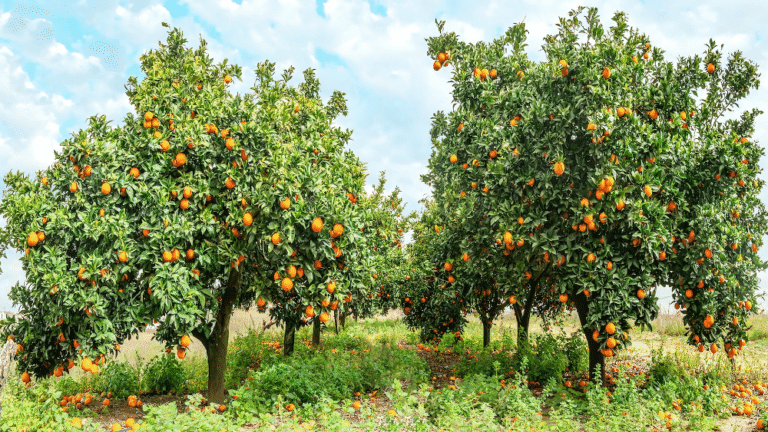Citrus farming in UK is evolving due to climate change, impacting crop patterns and yields. Learn how conditions are shifting. Brought to you by newzscoop. Did you ever imagine oranges and lemons growing in your backyard in the UK? Sounds far-fetched, right? Well, not anymore. In a clear sign of how climate change is transforming British agriculture, citrus fruits are now being grown outdoors on UK soil. What once seemed like a Mediterranean luxury is slowly turning into a local reality.
This unexpected twist in farming—especially on the Isle of Wight—is more than just an anomaly. It’s a sign of bigger changes in motion. According to a recent article in The Times, rising temperatures are not only affecting our weather patterns but are reshaping what we can grow and how we grow it. This shift opens the door to new possibilities, including citrus farming in the UK, and prompts us to rethink traditional agricultural norms.
The Citrus Farming in UK Boom on the Isle of Wight
So, where exactly is this citrus farming in uk revolution unfolding? Welcome to Ventnor Botanic Garden on the Isle of Wight, which has become an unlikely poster child for growing citrus fruits in Britain. Thanks to its unique geography—sheltered by chalk hills and warmed by a subtropical microclimate—Ventnor enjoys temperatures about 5°C warmer than the UK average.
This warmer microclimate has proven perfect for experimentation with exotic species. What started 15 years ago as a tentative trial has now become a full-blown success story. The garden is now home to over 30 varieties of citrus fruits, including mandarins, lemons, limes, and the bizarrely beautiful Buddha’s hand—a citron that looks like yellow fingers reaching toward the sky.
This is the first known outdoor citrus farming in UK, and it’s raising important questions about the changing face of UK agriculture and climate change. Could oranges and lemons one day be grown commercially on British farms?
Climate Change: A Double-Edged Sword
At first glance, this might seem like an agricultural dream come true. Who wouldn’t love freshly picked, locally grown oranges? But the bigger picture is more complicated. While warmer temperatures enable citrus farming in the UK, they also pose serious risks to the crops we’ve traditionally depended on.
Classic British crops—like apples, rhubarb, and even blackcurrants—rely on cold winters to thrive. As the climate warms, these crops face an uncertain future. This is the flip side of climate change’s impact on UK agriculture: as we gain the ability to grow new things, we risk losing the old.
This agricultural shift could permanently alter what ends up on our plates, impacting everything from food prices to cultural identity. Imagine a Britain without its iconic apple orchards—unthinkable, yet increasingly plausible.
Economic and Environmental Impact
There are upsides to producing climate-resilient crops in the UK. If citrus cultivation expands, it could:
- Reduce our reliance on fruit imports
- Lower carbon emissions from long-distance food transport
- Create local jobs and open new markets for niche exports
But it’s not all sunshine and oranges. Citrus trees are water-intensive, and the UK is already seeing more frequent droughts due to climate change. Expanding citrus farming could strain local water supplies, especially in areas not designed to support such crops.
Then there’s soil quality. Many parts of the UK don’t have the right pH balance or drainage for citrus trees. Farmers might need to use fertilizers, compost, or imported soils—raising environmental concerns and input costs. These are crucial factors to weigh when considering how UK agriculture and climate change intersect.
How the Government and Farmers Are Responding
The British farming community is taking notice. With climate change transforming British agriculture, some farmers are cautiously exploring alternative crops. Agri-tech companies are investing in research on everything from citrus farming in the UK to olives and even avocados. Meanwhile, DEFRA is ramping up support for sustainable practices and encouraging climate-resilient crops in the UK.
Still, change isn’t easy. Most farmers have grown the same crops for generations, with business models, equipment, and expertise built around them. Transitioning to unfamiliar fruits like citrus isn’t just a climate decision—it’s also about market demand, production risk, and long-term sustainability.
Farmers need incentives, training, and robust market data before they can commit to such a big switch. This is why pilot projects—like the one at Ventnor Botanic Garden—are so valuable. They offer insights into what works, what doesn’t, and how to adapt farming methods to a changing climate.
What the Future Could Look Like
If this trend continues, the future of British farming may include crops we never imagined growing on our shores. Kiwis, olives, and even avocados are now being trialed in parts of southern England. The idea of growing citrus fruits in Britain could soon be mainstream, not just a quirky experiment.
But we must proceed with caution. While the promise of tropical fruits in local shops is exciting, the environmental cost of forcing unsuitable crops into an ecosystem could be high. We must focus on climate-resilient crops in the UK that are both economically viable and environmentally sustainable.
Collaborations between farmers, scientists, and policymakers are crucial. With careful planning and responsible innovation, climate change’s impact on UK agriculture could be turned into a strength rather than a setback.
Final Thoughts
The sight of lemon trees basking in the British sun might once have seemed absurd. But today, it represents a fascinating—and urgent—chapter in our agricultural story. As climate change continues transforming British agriculture, it brings both opportunities and risks.
Citrus on the Isle of Wight isn’t just a novelty; it’s a signal that we are entering a new era. If we want that era to be fruitful rather than fragile, we must adapt wisely. Sustainable innovation, strategic crop planning, and a willingness to evolve will be essential in the coming years.
Whether you’re a farmer, a foodie, or just someone who enjoys a good orange, the story of citrus farming in the UK is one worth watching closely. After all, the future of British farming may be juicier than we ever imagined.


